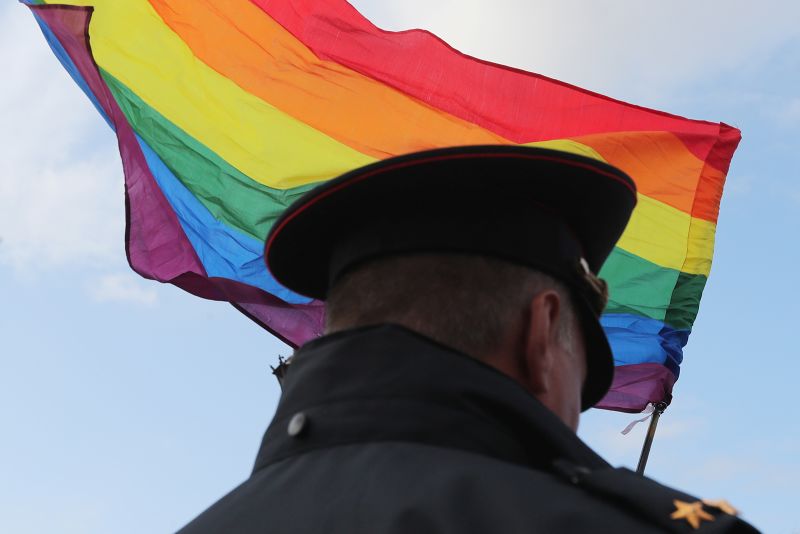
Police raid gay venues in Russia after top court bans ‘international LGBTQ movement’
Police carried out raids on gay venues in Russia late Friday, two online Russian news outlets reported, one day after the country’s top court ruled to ban the “international LGBTQ movement” and labelled it an extremist organization.
Thursday’s landmark ruling by the Supreme Court sent a fresh shiver of fear through Russia’s LGBTQ community, who have already faced an intensifying crackdown in recent years, as President Vladimir Putin seeks to shore up his image as defender of traditional moral values against the liberal West.
The raids took place in at least three entertainment venues in the capital Moscow, according to the two independent Russian Telegram news outlets, Ostorozhno Novosti and Sota.
Police said they were conducting routine drug raids, the outlets added.
Ostorozhno Moskva also reported that police photographed the passports of partygoers.
“Eyewitnesses said that security forces entered the premises under the pretext of an anti-drug check and photographed visitors’ passports,” it said. “In the middle of the party, they stopped the music and (the police) started entering the halls.”
The outlet also posted video of an eyewitness describing a fearful scene: “I was there. I honestly sh** myself when the music stopped and they said there was a police raid. I thought that was it, I would be imprisoned for 12 years. On the way out they took a photo of my passport (ID). So you understand, 300 of us stood naked, in only underwear, and waited for somebody to bring us clothes, and no one understood what was happening.”
Independent Telegram news channel Sota, citing an employee of the gay club Central Station in Moscow, reported the raids happened at the Secret Club and the Mono Bar in Moscow, as well as at the popular pop-up Hunters Party.
Sota also reported that the Central Station Club in St. Petersburg announced its closure on Friday, saying the club’s management said that they were denied further rental of the site due to the “new law.”
Video posted by the two news outlets show a police van parked outside what appears to be one of the venues with flashing lights but no sirens. At least two people who appear to be police officers can be seen at the entrance of the venue.
Well-known Russian transgender blogger and LGBTQ activist Milana Petrova – who is no longer living in the country – posted about the raids on her Telegram channel.
She said the raids were on private LGBTQ parties, not nightclubs.
“There were NO raids there yesterday. There were raids on individual LGBT parties for adults. There, people’s passports were photographed without their will, apparently for further repression,” Petrova posted on Sunday.
“Let me remind you that the law came out the day before yesterday,” Petrova said. “Never in the history of the country have there been such cruel laws,” she added.
The manager of the popular Mono gay club, who goes by the name Alexey Khoroshy, denied reports his club was raided. Khoroshy said only the pop-up party in Moscow was raided.
“Yesterday was the only drug raid at Hunters Party. So, everything is calm as before – we are working! And remember that drugs are evil!” Khoroshy said.
However, people chatting on an online group linked to the Hunters Party expressed their fear.
“No one will be at peace anymore, we are now balancing between propaganda and extremism,” posted one person directly linked to the Hunters Party on the group chat.
Another person responded: “It is dangerous, I won’t go anymore.”
Russian officials have not commented on the raids. There was no mention of routine drug or any other type of raids on state-run media.
Russia’s LGBTQ community have already faced a host of new laws that specifically target them.
Late last year Putin signed into law a bill that expands a ban on so-called LGBTQ “propaganda” in Russia, making it illegal for anyone to promote same-sex relationships or suggest that non-heterosexual orientations are “normal.”
The ban was rubber-stamped by Putin just days after a harsh new “foreign agents” law came into effect, as the Kremlin cracks down on free speech and human rights as its military operation in Ukraine falters.
The new laws significantly broaden the scope of a 2013 law which banned the dissemination of LGBTQ-related information to minors. The new iteration extends the ban on promoting such information to adults as well.
It is now illegal in Russia to promote or “praise” LGBTQ relationships, publicly express non-heterosexual orientations or suggest that they are “normal.”
Correction: An earlier version of this article misspelled the name of the Russian Telegram channel Ostorozhno Moskva and misidentified venue locations. The raids were only in Moscow.
